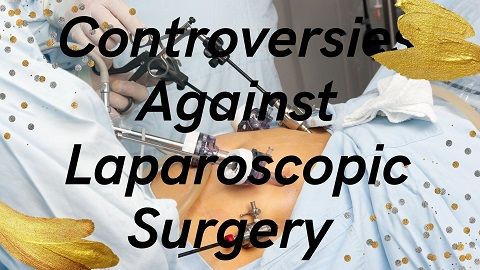Controversies Against Laparoscopic Surgery

Laparoscopic surgery, also known as minimally invasive surgery, is a surgical technique that uses small incisions and specialized tools to perform procedures inside the body. Although laparoscopic surgery is generally considered safe and effective, there are some controversies surrounding this technique. Here are a few of them:
Increased Cost: Laparoscopic surgeries can be more expensive than traditional open surgeries due to the specialized equipment and training required for the surgeon.
Longer Learning Curve: Performing laparoscopic surgery requires a steep learning curve, and some surgeons may not have adequate training or experience to perform the procedure safely and effectively.
Increased Risk of Complications: Although laparoscopic surgery is generally considered safe, it can increase the risk of certain complications, such as bleeding, infection, and organ damage.
Limited Visibility: The use of small instruments and a camera in laparoscopic surgery can limit the surgeon's field of view, making it difficult to visualize and manipulate certain structures.
Potential for Conversion to Open Surgery: In some cases, laparoscopic surgery may need to be converted to an open surgery due to complications or technical difficulties, which can increase the risk of complications and prolong recovery time.
Longer Operating Time: Laparoscopic surgery can take longer to perform than traditional open surgery, which can increase the patient's exposure to anesthesia and increase the risk of complications.
It is important to note that many of these controversies are the subject of ongoing research and debate, and that laparoscopic surgery remains a widely used and effective surgical technique for many types of procedures. As with any medical procedure, it is important to discuss the potential risks and benefits of laparoscopic surgery with your doctor before undergoing any treatment.
Like any surgical procedure, laparoscopic surgery comes with potential risks and complications. Here are some of the most common complications associated with laparoscopic surgery:
Infection: Laparoscopic surgery can increase the risk of infection, which can range from minor wound infections to more serious infections of the surgical site or internal organs.
Bleeding: Like all surgeries, laparoscopic surgery carries the risk of bleeding, which can range from minor bruising to life-threatening hemorrhage.
Damage to organs: The instruments used in laparoscopic surgery can damage nearby organs, including the intestines, bladder, blood vessels, or ureter.
Blood clots: Blood clots can form in the veins after laparoscopic surgery, which can be life-threatening if they break loose and travel to the lungs or heart.
Adverse reaction to anesthesia: Some patients may experience an allergic reaction or other adverse reaction to the anesthesia used during laparoscopic surgery.
Pneumothorax: A pneumothorax is a condition where air leaks into the space between the lung and chest wall, which can occur when a lung is accidentally punctured during laparoscopic surgery.
Conversion to open surgery: In some cases, laparoscopic surgery may need to be converted to an open surgery due to complications or technical difficulties, which can increase the risk of complications and prolong recovery time.
It is important to note that many of these complications are rare, and the benefits of laparoscopic surgery often outweigh the risks. However, it is important to discuss any potential risks or concerns with your doctor before undergoing laparoscopic surgery.
1 COMMENTS
Dr. Tapan Banerjee
#1
Mar 23rd, 2023 11:43 am
Controversies surrounding laparoscopic surgery include concerns over the risk of major complications such as bleeding and organ damage, as well as the potential for longer operating times and higher costs compared to traditional open surgery. However, many studies have shown that laparoscopic surgery can offer numerous benefits, including less pain, faster recovery, and reduced hospital stays.
| Older Post | Home | Newer Post |

